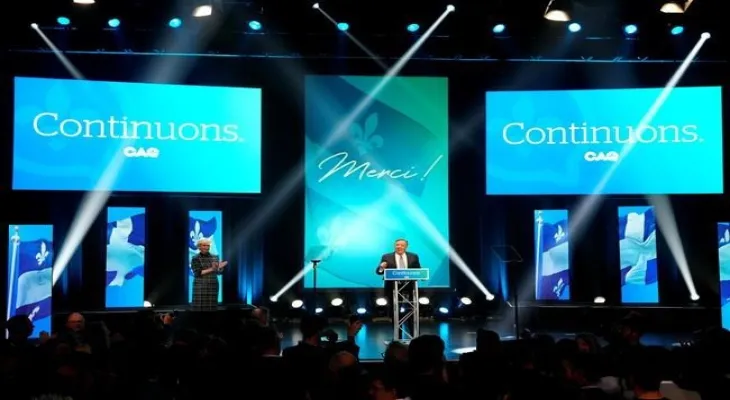Search here
Newspaper
Search here

Arab Canada News
News

Published: October 4, 2022
Quebec - Controlling immigration and banning religious symbols in Quebec could be a source of conflict between Ottawa and the province as Premier François Legault begins his second term. The Coalition Avenir Québec was re-elected on Monday with a landslide majority, being elected or leading in 89 of 125 ridings in the province as of 11:30 p.m.
Martin Papillon, a political science professor at the University of Montreal, said the balance of power between Prime Minister Justin Trudeau and Legault has perhaps shifted in favor of the Quebec premier.
In a recent interview, Papillon said the stronger mandate could encourage Legault. He said Trudeau would need to be cautious in dealing with Quebec – and the premier who claimed to represent all Quebecers in Ottawa – as polls show increasing support for Pierre Poilievre's Conservatives.
“Tension with the federal government does not serve the federal government’s interests, but it certainly serves Legault’s government’s interests in Quebec,” Papillon said. “It slightly strengthens his position and the vision he wants to present, his independent and nationalist vision that does not want to reopen the constitutional question.”
During the election campaign, Legault repeatedly spoke about immigration, often claiming that too many immigrants would jeopardize the survival of the French language in the province. He said he wants Ottawa to give Quebec – which already selects its economic immigrants – control over family reunification and temporary foreign workers.
“I think this will be a major sticking point with the federal government in the coming months,” Papillon said.
Legault said in May that a stronger mandate would help him gain additional powers over immigration, but André Lecours, a professor at the School of Political Studies at the University of Ottawa, said he believes it is unlikely the federal government will bow to Quebec’s demands.
Lecours said the conflict between Legault’s and Trudeau’s governments over immigration stems essentially from different ideas about diversity. While the federal government encourages multiculturalism, Legault called for integration focused on the French language and shared values, including secularism.
“It is this different vision of identity and diversity that causes the clash with the federal government.” These differing ideas could also lead to a dispute over Quebec Bill 21, which bans public sector workers in positions of authority, including teachers, police officers, and judges, from wearing religious symbols while working. In May, federal Justice Minister David Lametti said if a legal challenge to the law reaches the Supreme Court, the federal government will intervene.
Legault’s government relied on the notwithstanding clause, however, to shield the law from legal challenges, arguing that the use of the constitutional provision was justified because a majority of Quebecers support the legislation. The premier condemned criticism of the law from English Canada.
Papillon said any federal intervention in courts would play into Legault’s hands, as it underlined the divide between English-speaking Canada and Quebec on this issue. One of the big questions in Legault’s new mandate will be what happens if the federal Liberals change leaders or if the Conservatives take power in the next federal election.
Ideologically and in political style, Legault is closer to the federal Conservatives than any other party.
While Papillon said he is hesitant to compare Legault to Poilievre because they are “two different political animals,” he adds that like Poilievre, Legault demonstrated during the campaign that he is not afraid to court controversy. At one point, he apologized after linking immigration to violence and extremism. But for one of his former colleagues, his controversial remarks and the sometimes following apologies are familiar.
Louise Harel said the Legault seen in the premier’s office is the same man she knew when they were both ministers in the PQ government in the 1990s and early 2000s. She said in a recent interview that his habit of speaking impulsively often forces him to backtrack, but this plays well with many Quebecers, who see themselves as marginalized.
Harel said Legault has always seen time spent debating in the legislature as a waste and has adopted a top-down style of government, with centralized power in his office and that of a few key ministers.
“It’s really like a private company, so he’s the CEO and there is an executive committee, just like in a very big company.
Edited by: Yusra Bamtaraf
Comments